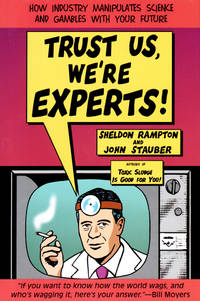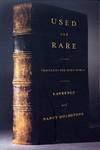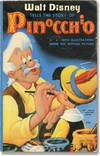
Trust Us, We'Re Experts!: How Industry Manipulates Science and Gambles with Your Future
by Rampton, Sheldon; Stauber, John
- Used
- near fine
- Hardcover
- Condition
- Near Fine/Near Fine
- ISBN 10
- 158542059X
- ISBN 13
- 9781585420599
- Seller
-
Hopkins, Minnesota, United States
Payment Methods Accepted
About This Item
Synopsis
The authors of Toxic Sludge Is Good for You! unmask the sneaky and widespread methods industry uses to influence opinion through bogus experts, doctored data, and manufactured facts. We count on the experts. We count on them to tell us who to vote for, what to eat, how to raise our children. We watch them on TV, listen to them on the radio, read their opinions in magazine and newspaper articles and letters to the editor. We trust them to tell us what to think, because there’s too much information out there and not enough hours in a day to sort it all out. We should stop trusting them right this second. In their new book Trust Us, We’re Experts!: How Industry Manipulates Science and Gambles with Your Future, Sheldon Rampton and John Stauber, authors of Toxic Sludge Is Good For You , offer a chilling exposé on the manufacturing of "independent experts." Public relations firms and corporations know well how to exploit your trust to get you to buy what they have to sell: Let you hear it from a neutral third party, like a professor or a pediatrician or a soccer mom or a watchdog group. The problem is, these third parties are usually anything but neutral. They have been handpicked, cultivated, and meticulously packaged in order to make you believe what they have to say—preferably in an "objective" format like a news show or a letter to the editor. And in some cases, they have been paid handsomely for their "opinions." For example: You think that nonprofit organizations just give away their stamps of approval on products? Bristol-Myers Squibb paid $600,000 to the American Heart Association for the right to display AHA’s name and logo in ads for its cholesterol-lowering drug Pravachol. SmithKline Beecham paid the American Cancer Society $1 million for the right to use its logo in ads for Beecham’s Nicoderm CQ and Nicorette anti-smoking ads. You think that a study out of a prestigious university is completely unbiased? In 1997, Georgetown University’s Credit Research Center issued a study which concluded that many debtors are using bankruptcy as an excuse to wriggle out of their obligations to creditors. Former U.S. Treasury Secretary Lloyd Bentsen cited the study in a Washington Times column and advocated for changes in federal law to make it harder for consumers to file for bankruptcy relief. What Bentsen failed to mention was that the Credit Research Center is funded in its entirety by credit card companies, banks, retailers, and others in the credit industry; that the study itself was produced with a $100,000 grant from VISA USA, Inc. and MasterCard International; and that Bentsen himself had been hired to work as a credit-industry lobbyist. You think that all grassroots organizations are truly grassroots? In 1993, a group called Mothers Opposing Pollution (MOP) appeared, calling itself "the largest women’s environmental group in Australia, with thousands of supporters across the country." Their cause: A campaign against plastic milk bottles. It turned out that the group’s spokesperson, Alana Maloney, was in truth a woman named Janet Rundle, the business partner of a man who did P.R. for the Association of Liquidpaperboard Carton Manufacturers—the makers of paper milk cartons. You think that if a scientist says so, it must be true? In the early 1990s, tobacco companies secretly paid thirteen scientists a total of $156,000 to write a few letters to influential medical journals. One biostatistician received $10,000 for writing a single, eight-paragraph letter that was published in the Journal of the American Medical Association. A cancer researcher received $20,137 for writing four letters and an opinion piece to the Lancet , the Journal of the National Cancer Institute, and The Wall Street Journal . Rampton and Sta...
Reviews
(Log in or Create an Account first!)
Details
- Bookseller
- Walther's Books
(US)
- Bookseller's Inventory #
- 007692
- Title
- Trust Us, We'Re Experts!: How Industry Manipulates Science and Gambles with Your Future
- Author
- Rampton, Sheldon; Stauber, John
- Format/Binding
- Hardcover
- Book Condition
- Used - Near Fine
- Jacket Condition
- Near Fine
- Quantity Available
- 1
- Edition
- Reprint 2nd Printing
- ISBN 10
- 158542059X
- ISBN 13
- 9781585420599
- Publisher
- Jeremy P Tarcher
- Place of Publication
- New York
- Date Published
- 2001
- Pages
- 360
- Keywords
- CORPORATIONS CORPORATE_CORRUPTION CORPORATE_POLITICCS
- Size
- 4to - over 9¾ - 12" tall
Terms of Sale
Walther's Books
About the Seller
Walther's Books
About Walther's Books
Glossary
Some terminology that may be used in this description includes:
- Shelf Wear
- Shelf wear (shelfwear) describes damage caused over time to a book by placing and removing a book from a shelf. This damage is...
- Reprint
- Any printing of a book which follows the original edition. By definition, a reprint is not a first edition.
- Tight
- Used to mean that the binding of a book has not been overly loosened by frequent use.
- Fine
- A book in fine condition exhibits no flaws. A fine condition book closely approaches As New condition, but may lack the...

